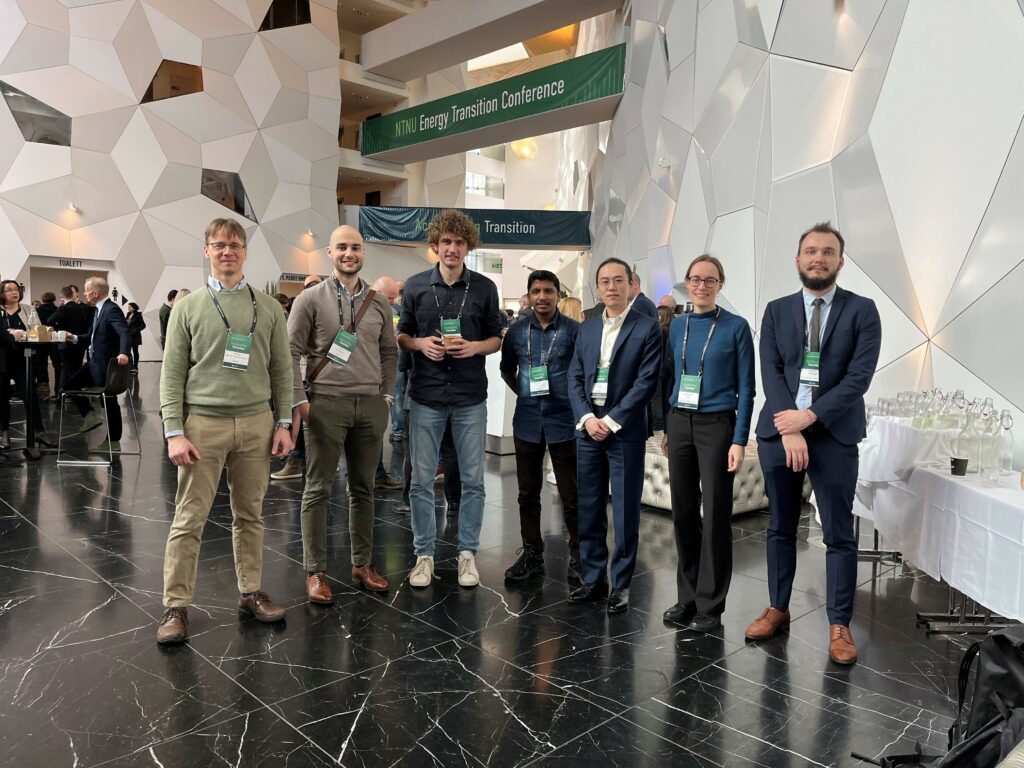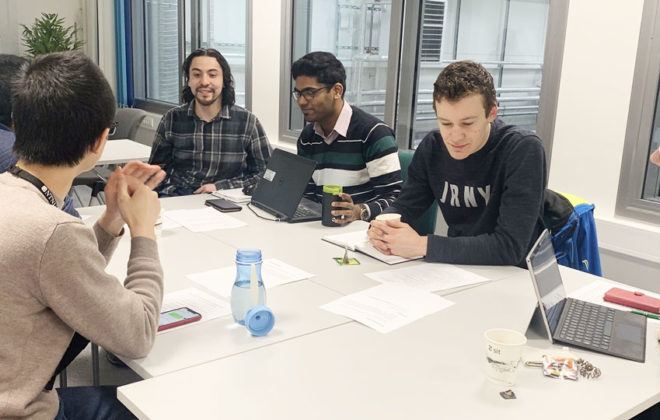Accelerating Transition at NTNU Energy Transition Conference 2022

After 2 years of virtual NTNU Energy Transition Conference due to the pandemic, more than 700+ academics, industry representatives and policymakers from 30+ countries gathered physically in Trondheim to debate challenges and solutions for a just transition towards a future sustainable energy system.
A group of PhD students and researchers working on energy transition from NTNU and other international universities participated in this event to exchange ideas and listen to the high-level debate from industries and governments.
“Access to affordable energy is key for economic growth, business and good lives across the world,” said the Minister of Petroleum and Energy of Norway, Terje Aasland. With the greeting from the minister, a day of fact-based debate started.
Offshore wind and hydrogen
The energy transition was addressed worldwide at the conference. Offshore wind and hydrogen triggered several discussions. The North Sea offshore wind with 300 GW capacity target by 2050 can be a key factor in the transition towards independent energy supply and zero emission.
Energy dependence
In light of Russia’s invasion of Ukraine, energy dependence has become an important part of the debate. “We may need to boost our own gas production to be independent,” said the rector of NTNU, Anne Borg. To do that, the emissions from production and the indirect emissions should be taken care of for the global climate target.
Decarbonising offshore fields
Equinor representative, Elisabeth Birkeland Kvalheim, mentioned that Equinor aims to spend 50% of its investments on renewable and low carbon technologies in the years to come. Equinor also sets a goal to reduce 50% of its emissions by 2030. The Chief Scientist at SINTEF, John Olav Giæver Tande pointed out that offshore wind needs faster deployment to contribute to the onshore energy system decarbonisation and supplying clean power to offshore platforms for zero-emission production. Zero-emission production has become more important than ever for the security of supply in the EU.
My PhD project
As a PhD student working on offshore platforms’ decarbonisation and offshore energy hubs, the conference helped me understand the industries’ and governments’ shared objectives and how my research can potentially help achieve the goal.
In my PhD project, we analyse the potential role of hydrogen-based offshore energy hubs and green hydrogen in the energy transition and offshore platforms’ decarbonisation. Data acquisition has always been difficult during research, especially studies involving the oil and gas industry. The speakers mentioned that collaboration on data sharing could help investors make better decisions. Data sharing is also crucial in research. Real-world data can lead to more accurate and meaningful analysis. Collaboration on data sharing among academics and industries can benefit both sides.
Global energy transition and China
In addition to the debate within the EU, global energy transition was discussed. Associate Professor at Carnegie Mellon University, Valerie Karplus mentioned the huge progress in the energy transition in China and pointed out the big contrast in western and eastern China in terms of the energy transition and other aspects. As a Chinese PhD student working on energy transition, I am proud of what China has achieved and deeply understand the greater difficulties China may face to become carbon neutral by 2060.
Global cooperation
Valerie Karplus also mentioned that signalling of potential demand and global cooperation among China and other countries could potentially share the cost burden in renewables. However, collaboration may not be favoured in all aspects.
Becoming more independent?
Professor Suzana Kahn Ribeiro at the Federal University of Rio de Janeiro stated that countries may need to be as independent as possible on essential goods, including energy. However, as a PhD student doing operational research, from my point of view, global collaboration may still be largely needed to accelerate the energy transition to reach global optimality.
Energy transition without damaging the planet
“We need to speed up the energy transition without damaging the planet”, Professor Asgeir Tomasgard, Director of NTNU Energy Transition Initiative, concluded the conference. The fruitful conference day leads to a week of workshops focusing on energy transition, including sustainable infrastructure and energy commodities for section integration, the future of nuclear energy and negative emissions, among others.
This annual conference that started in 2017 will continue for the years to come and bring more academics, industries, and policymakers together to exchange fact-based knowledge for accelerating energy transition and making the world a better place.
Conference website: https://www.ntnu.edu/energytransition/home
Hongyu Zhang

Hongyu Zhang is a PhD candidate at the Department of Industrial Economics and Technology Management (IØT), NTNU.
Tags In
Hongyu Zhang
Search
Søk
Categories
- Arctic Research
- Arkitektur
- Bærekraft
- Bioingeniørfag
- Biologi
- Biology
- Biomedical Laboratory Science
- Biotechnology
- Bioteknologi
- Chemical Engineering
- Chemistry
- Climate
- Computer Science
- Datateknologi
- Digital
- Elektronikk
- Energi
- Energi
- Energy
- Engineering
- Engineering
- Environment
- Food Science
- Forskning
- Fysikk
- Fysikk
- Havbruk
- Informasjonsteknologi
- Informasjonsteknologi
- Ingeniørvitenskap
- Kjemi
- Kjemisk prosessteknologi
- Kjemisk prosessteknologi
- Kreftbehandling
- Kybernetikk
- Marine Technology
- Materialer
- Materials Science
- Materialteknologi
- Matvitenskap
- Meninger
- Miljø
- Min ph.d.
- My PhD
- My PhD
- My postdoc
- Nanotechnology
- Nanoteknologi
- Ocean
- Oil and gas
- Physics
- Research
- Simulering og visualisering
- Spør en forsker
- Studentliv
- Sustainability
- Ukategorisert
- Universitetsliv
- University Life
Kategorier
- Arctic Research
- Arkitektur
- Bærekraft
- Bioingeniørfag
- Biologi
- Biology
- Biomedical Laboratory Science
- Biotechnology
- Bioteknologi
- Chemical Engineering
- Chemistry
- Climate
- Computer Science
- Datateknologi
- Digital
- Elektronikk
- Energi
- Energi
- Energy
- Engineering
- Engineering
- Environment
- Food Science
- Forskning
- Fysikk
- Fysikk
- Havbruk
- Informasjonsteknologi
- Informasjonsteknologi
- Ingeniørvitenskap
- Kjemi
- Kjemisk prosessteknologi
- Kjemisk prosessteknologi
- Kreftbehandling
- Kybernetikk
- Marine Technology
- Materialer
- Materials Science
- Materialteknologi
- Matvitenskap
- Meninger
- Miljø
- Min ph.d.
- My PhD
- My PhD
- My postdoc
- Nanotechnology
- Nanoteknologi
- Ocean
- Oil and gas
- Physics
- Research
- Simulering og visualisering
- Spør en forsker
- Studentliv
- Sustainability
- Ukategorisert
- Universitetsliv
- University Life



